Action Plan
Opportunities To Love Families Through Alzheimer’s and Related Dementias
To Become a Dementia Friendly Faith Community
Choose a plan of action that best fits your faith community, or your own individual gifts
Table of Contents
Engagement with the cognitively impaired should not be seen as another responsibility to be added to the already overloaded pastors and congregational leaders. Rather, it is an invitation to meet God in fresh ways, to experience the reality behind the church’s doctrines, and to be transformed and renewed by love that endures when knowledge and language cease.
Kenneth L. Carder, Ministry with the Forgotten: Dementia Through a Spiritual Lens
A Call To Act Now
Sheila Welch - Coordinator/Developer
Loving Through Dementia
Faith Communities Have A Unique Opportunity
Retired Bishop Kenneth Carder
Ministry With The Forgotten: Dementia Through A Spiritual Lens
Start Now
Use What You Have
Do What You Can
- Lynda Everman
1. Encourage
- Pray
- When you pray move your feet. (African Proverb):
- Phone
- Text
- Send Cards
- Deliver Meals
Let these families know you are thinking of them and praying for them. Each of these ideas might be a stand alone ministry for an individual or a group. See #3 on this Action Plan for more ideas.
A Loving Through Dementia volunteer, Lori Marsten, chose to begin a card ministry. Lori creates cards for families facing dementia, and sends uplifting messages throughout the year. Each card is mailed with an Alzheimer's stamp. A sampling of Lori's cards:
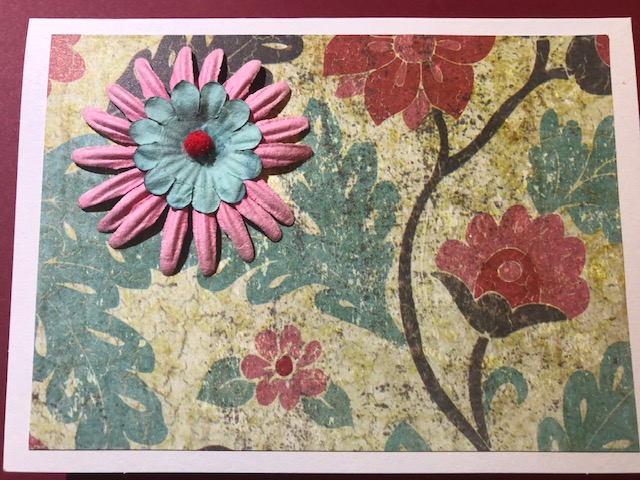
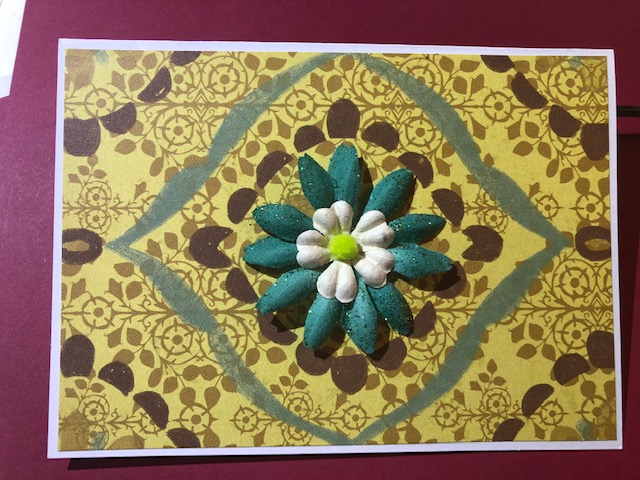
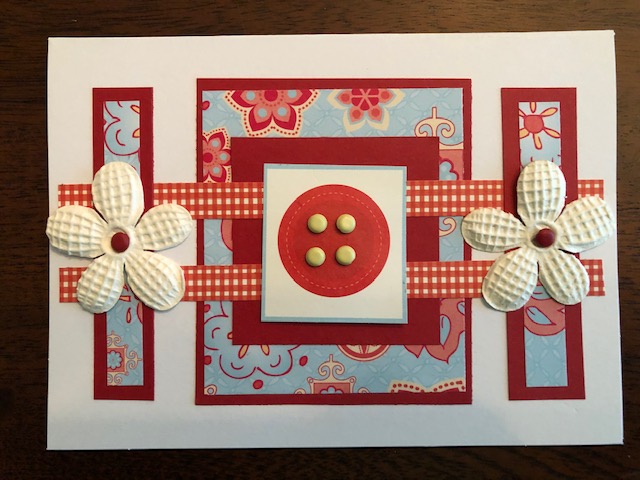
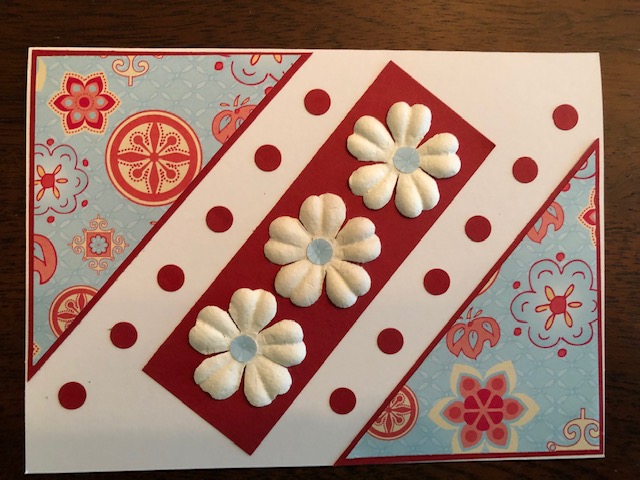
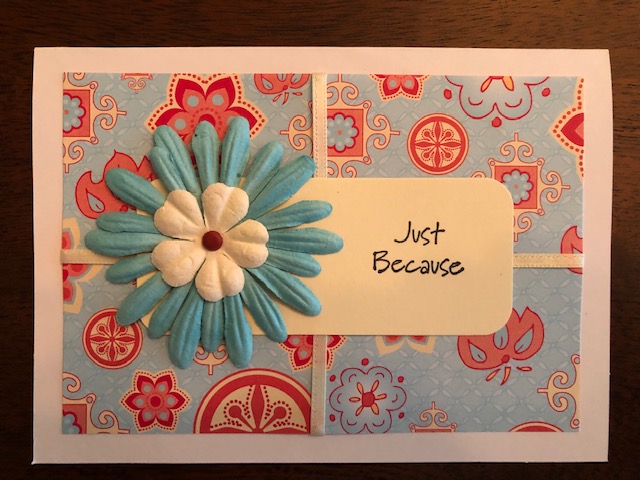
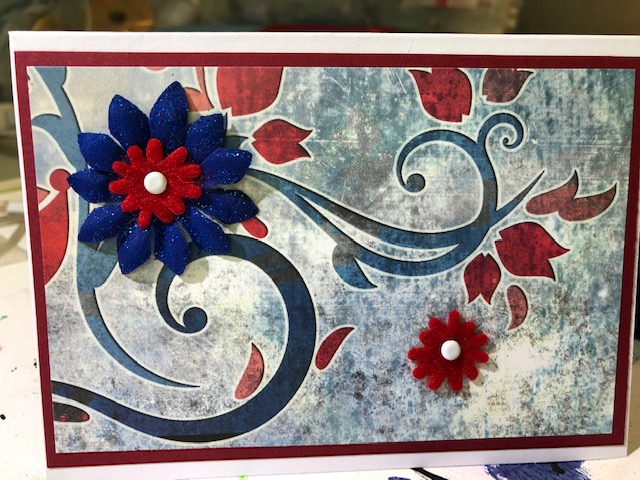
Lynda Everman chose to use cards containing the art of Lester Potts for her own card ministry: The image for this lovely Forget-Me-Not notecard was painted by the late Lester E. Potts, Jr. who learned to paint in the throes of dementia. See #9 in this Action Plan to learn more about Lester and his artwork.
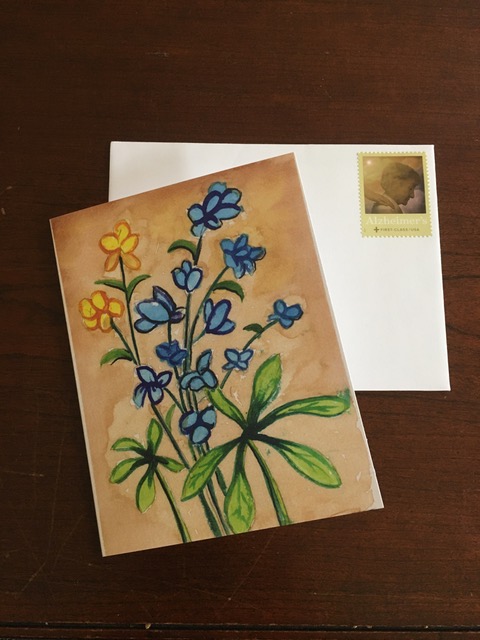
Promote the Use of the Alzheimer’s Stamp
Help StampOut Alzheimer’s
Faith communities, individuals, or groups (Bible studies, Sunday School Classes, etc.) can raise dementia awareness and increase funding for research for prevention, treatment, and eventually a cure by promoting the use of the Alzheimer’s Stamp. Use on all Christmas cards, occasional cards, all correspondence.
One sheet of the Alzheimer’s Stamp (officially, the Alzheimer’s Disease Research Semi-Postal Stamp) is $15.00. For every sheet purchased, $2.40 goes to NIH for research.
As of the end of December 2022, the total amount raised for research is more than $1.3 million. Purchase this semi-postal stamp here.
An idea for Caregivers:
Sometimes, as family caregivers, we feel we can do very little to fight for a cure for this relentless illness. Here is a thought: Today, there are 11 million unpaid family caregivers. If each of us purchased only one sheet of Alzheimer’s Stamps ($15.00), caregivers alone could raise $26.4M to go to NIH for life saving research.
2. Give the Gift Of Your Presence
Dementia cannot be cured, but loneliness can.
- Daphne Johnston, Co-Founder: RespiteForAll Foundation
Caregivers tell us that as dementia progresses, life-long friends, family, and even ministers no longer visit. People who have been faithful members of the faith community are left in crushing loneliness and isolation. How can that be?
- It could be that due to the stigma associated with Alzheimer’s and related dementias, the family has not told their minister, faith community friends, or even other family members that dementia is now a part of their lives.
- Sadly, it could be fear of the unknown that keeps us away. Friends, family, and many ministers are afraid of saying or doing the wrong thing...afraid of upsetting the person who lives with dementia...afraid of an embarrassing scene. The good news is that we can learn how to visit...how to connect and have meaningful relationships...we can learn how to love...better.
Building Relationships with Persons Living With Dementia
Reverend Kathy Berry
When Words Fail: Practical Ministry to People with Dementia and Their Caregivers
Resource Links
3. Include, Befriend, Support Persons Living With Dementia.
Help to break the stigma associated with this illness.
We all want to belong, to contribute, to have purpose. The same is true for people who live with dementia. We can learn to include, befriend and support. We can bring these families into the center of our faith communities.
We can learn to include people living with dementia in volunteer activities and in as many activities in the faith community as possible...for as long as possible.
It is true that cognitive abilities are constantly being lost, but we are so much more than our cognitive abilities. Throughout the journey, faith communities have the opportunity to recognize, encourage, and appreciate the abilities that remain. We can open our minds and hearts to see not a person who lives with dementia, rather simply the person. When that happens, blessings begin...for the person living with dementia...for their families...and for the rest of us.
As we learn to listen, to observe, to be present, and to become memory keepers, we will realize that people with dementia are teaching us, transforming us, and loving us even to the end of their journey.
The following passage is from the intimate and beautiful conclusion of Ministry with the Forgotten. It is wriiten by retired United Methodist Bishop Kenneth Carder to honor his wife Linda, who lived with Frontotemporal dementia.
As I write these words, Linda sleeps calmly in the bed nearby...Dementia has impacted every aspect of our lives and continues to influence how we feel, relate, believe, and behave. Although Linda’s ability to comprehend, communicate, and react is now severely limited, her very being continues to inform, inspire and enrich my life. We, as a family and extended community, now hold her memories and foster her identity as a child of God with inherent worth and dignity.
Inasmuch as you have done it unto one of the least of these you have done it unto me.
Matthew 25:40
Faith Communities can break the stigma associated with Alzheimer’s and all neurocognitive disorders. We can begin by learning from true dementia experts...those who live with dementia. Please share the following videos in your groups, classes, conferences etc.
See Me, Not My Dementia
Reverend Dr. Cynthia Huling Hummel
Meet Doug Jones and his wife, Shana
Meet Brian LeBlanc
Meet Mark Roberts and his wife, Brenda
Dr. Daniel Potts and The Reverend Dr. Cynthia Huling Hummel
Resource Links
Opportunities to Minister With People Living With Dementia
- Include people who live with dementia in as many activities in your faith community as possible:
- Sunday School Class
- Choir
- Bible Study
- Ushering
- Volunteer projects
- All activities possible and for as long as possible
- Befriending, becoming a buddy in these activities makes it possible for the person living with dementia to participate...to contribute...and to have purpose...longer.
- Clergy: and Leaders: Look for ways to include people who live with dementia and their families in your Worship service. Resources that can guide you:
- Let your local community know that you welcome families facing dementia. Send the message that families facing dementia are not alone, not forgotten.
- Learn how to be present. To Visit. To spend time with. Kathy Berry can guide us:
- Build a relationship. If you do not already know the person, listen to them. Learn their story. We all have one...share yours with them. If sharing is not possible due to the progression of the illness, find out their story from family or friends.
- Invite the person living with dementia to come to choir. Be their choir buddy.
- Invite the person living with dementia to do volunteer projects with you. Provide transportation.
- Take the time to find out what he/she likes to do, and do it. (Lunch, Golf, Antiquing, cooking, taking walks, etc.)
- Become a “Buddy” during activities of your faith community so that the person with dementia might participate and feel vital longer.
Raise dementia awareness and knowledge throughout the many groups in your faith community.
Educate yourselves by using the resources in this Action Plan. Share what you have learned.
- Host Dementia Conversations or perhaps a Book Club using our Action Plan resources.
- Provide group discussions using the free downloadable guide: Still Standing: A Guide for Loving through Alzheimer’s and Related Dementias.
- Provide the free five-part course for faith communities: Alzheimer’s/Dementia: Ministry with the Forgotten
- Use this Action Plan for more Ideas or follow your heart in new ways to serve.
Include, Befriend, Support the Families
When one person lives with dementia, everyone who loves that person lives with dementia, as well.
Sheila Welch
Meet Rick & Martha Perry
What does dementia mean to the family loving someone through this illness?
We call on experts to give us that perspective. Rick Perry and his family are loving his wife, Martha through Early Onset Alzheimer’s. Their story inspires us all to do more, to love better.
Reach out to the caregivers (care partners, care supporters), whichever you choose to call those who love someone through dementia. Get to know them. Talk to them about how dementia has changed their lives, and about how their faith community can better meet their needs. Listening is a ministry.
- Ask the family to sit with you during worship. Greet them when they arrive.
- Take the time to find out what the caregiver likes to do, and do it. (Lunch, Golf, Antiquing, cooking, taking walks, etc.
- Listen. Listening is an act of love.
- Offer to run errands.
- Deliver meals.
- See other opportunities listed in this Action Plan
The problem is not that people with dementia forget. The problem is that they are forgotten.
Pastoral Theologian John Swinton
Understand that families facing dementia...the persons living with it and the families loving them through it...are grieving. It is a perpetual grief that lasts throughout the journey. We can walk with them. We can lift them up. We can let them know that they belong to a community of faith...they are not forgotten.
Dementia: A Journey With Grief
Reverend Hal Cole
Director of Spiritual Care at a long term care community, Support Group Facilitator, Grief Specialist, and former Hospice Chaplain
4. Become a Dementia Friendly Faith Community...A Dementia Loving Faith Community
Leaders: Where do you begin?
Educate Yourselves
The following resources will raise dementia awareness, provide dementia education and offer insights into how to include, support and love persons who live with dementia.
Dementia Through A Lens of Grace
Bishop Kenneth L. Carder
- $ Ministry with the Forgotten: Dementia Through a Spiritual Lens
- $ Dementia-Friendly Worship: A Multifaith Handbook for Chaplains, Clergy and Faith Communities
- Alterdementia.com: Inspiring and Equipping African American Faith Communities
- Creating Dementia Friendly Faith Communities
- The Dementia Friendly Church - The United Methodist Church
- $ When Words Fail: Practical Ministry to People with Dementia and Their Caregivers
- No Act of Love is Ever Wasted: The Spirituality of Caring for Persons with Dementia
- Teepa Snow's Courageous Conversation with Dr. Kenneth Carder Part 1
- Teepa Snow's Courageous Conversation with Dr. Kenneth Carder Part 2
Additional Resources
A basic dementia education is found in our free downloadable guide and its suggested resources:
To better love and better serve these families, leaders must know what dementia is, what it means to the person living with it, and what it means to the family.
Familiarize yourself with Bishop Ken Carder’s five-part course for faith communities:
Learn From and Share Loving Through Dementia Conferences and Workshops
- Multi-Faith and Community Workshops 2019, 2022
- Care Partners Conferences 2019
- Dementia Conversations 2021
- Dementia Family Conference 2022
How Do We Minister With The Spirit of Persons Living With Dementia?
Reverend Hal Cole
Director of Spiritual Care at a long term care community, Support Group Facilitator, Grief Specialist, and former Hospice Chaplain
Reverend Linn Possell
Director of Caregiver Training and Education, Founder of LiveWell Dementia Training, Creator LiveWell Wellness Review
Additional Dementia Educational Resources
- Teepa Snow’s free YouTube Videos
- Dr. Peter Rabin’s free YouTube Videos
- Teepa Snow’s Free Online Dementia Journal
- $ Learning to Speak Alzheimer’s
- $ Dementia Guide for Communities of Faith and Leaders
- $ Spirituality in Dementia Care with Teepa Snow and Rev. Linn Possell (Video)
- $ Seasons of Caring: Meditations for Alzheimer’s and Dementia Caregivers
- $ Companion Leader Guide
Available Dementia Training Courses
- Teepa Snow’s Positive Approach to Care Training
- Rosalynn Carter Institute for Caregiving: Dealing with Dementia
- UCLA Caregiver Training Videos
Educate Your Congregation and Your Community
Teach what you have learned. Find ways to share the resources already suggested in this section:
- To raise dementia awareness
- To provide dementia education
- To help break the stigma that comes with dementia
- To send the message: You are not alone, not forgotten
Our Action Plan is Here to Guide You
5. Become a Dementia Friendly Community, Town, City, or State
The GA Division of Aging Services recently received a license to provide Dementia Friends information sessions in Georgia. Dementia Friends Champions are trained to provide these sessions. The sessions last 1 hour. Dementia Friends is part of a global movement that is changing the way people think, act, and talk about dementia. The Georgia Gerontology Society is assisting with training champions and getting the word out.
Resource Links
6. Begin a Support Group
Caregivers have taught me that a key to surviving the caregiving journey is realizing there are others who are living their lives. There is power in being with those who understand. Support Groups offer this power. They offer help, hope and a particular healing that comes only from sharing and contributing to the healing of others.
- Sheila Welch
Resource Links
- Begin a Support Group: A Step By Step Guide
- Still Standing: A Guide for Loving through Alzheimer’s and Related Dementias
- Alterdementia.com: Inspiring and Equipping African American Faith Communities
- $ A Pocket Guide for the Alzheimer’s Caregiver
- $ The 36-Hour Day: A Family Guide to Caring for People Who Have Alzheimer Disease, Other Dementias, and Memory Loss (A Johns Hopkins Press Health Book)
- $ Seasons of Caring: Meditations for Alzheimer’s and Dementia Caregivers
- $ Companion Leader Guide
- $ No Act of Love is Ever Wasted: The Spirituality of Caring for Persons with Dementia
- The Alter Program: Inspiring and Equipping Faith Communities
- $ Loving Someone Who Has Dementia
7. Host a Conference, Seminar, or Workshop
Host the event yourself, or join forces with other faith communities to make ministering with these families a combined...even ecumenical...effort. You may also take this opportunity to co-host events with community leaders and organizations.
Choose To Begin
Reverend Terri Henkel
Associate Pastor - Alpharetta First United Methodist Church
Alpharetta, GA
Resource Links
8. Begin a Music Ministry
Volunteers have an opportunity to bring music and song to persons living with dementia. Familiar music, poetry and prayer often can be enjoyed throughout the entire journey.
Advocate, Psychologist, Musician, Author, and Caregiver, Don Wendorf chose to share his musical talent with persons living with dementia.
Begin a Dementia Choir
You might begin a choir for those who live with dementia or encourage their participation in the existing choir. For people with memory loss, choirs offer powerful stimulation and enhanced social connections.
Side by Side Choir
Montgomery First United Methodist Church
The Side by Side Choir was founded in 2015 to create a singing experience for those living with dementia to find joy and community. In 2022, this video performance of You've Got A Friend raised $5,000 for Ukraine.
Other ways to bring music to people who live with dementia:
Linda's Valentine's Day Serenade
Nancy's Mama - Hospice Therapy
Resource Links
Even those who can no longer communicate verbally, may join in as you sing familiar songs, clap along to the rhythm or recite familiar poetry or prayers...as seen in this video of Naomi Feil and Gladys Wilson. Naomi Feil is an American gerontologist who developed Validation therapy (holistic therapy that focuses on empathy and provides means for people with cognitive deficit and dementia to communicate).
A Message From People Living With Dementia...I'm Still Here
9. Bring the Arts to People Living with Dementia
The human brain has special capabilities which we may call, “The Gift,” through which memories of music, poetry, and prayer, especially those laden with emotional content, are more resistant to the effects of dementia. Memories associated with “the arts.” Even if language is no longer available, this “Gift” most often remains, offering wonderful opportunities to reach people living with dementia. Faith communities can bring these memories to life!
Volunteers might offer art to persons living with dementia. It was a volunteer who introduced Lester Potts to a paint brush and paper. A volunteer who saw Lester, not as a person who lived with dementia, but as a person. Lester, who could no longer communicate with words, began to tell us his story through his art.
Building Better Relationships Through The Arts
Dr. Daniel C Potts
Neurologist, Author, Advocate, and Caregiver
Resource Links
- Lester Potts YouTube
- $ Treasure for Alzheimer’s: Reflecting on experiences with the art of Lester E Potts, Jr.
- Cognitive Dynamics - Bringing Art to Life
- $ Bringing Art to Life: Reflections on Dementia and the Transforming Power of Art and Relationships
Like Lester Potts, Linda, the wife of a Loving Through Dementia spouse group member, was not an artist before Alzheimer’s entered her life.
Linda's Art:

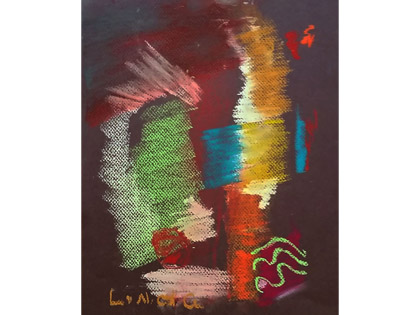

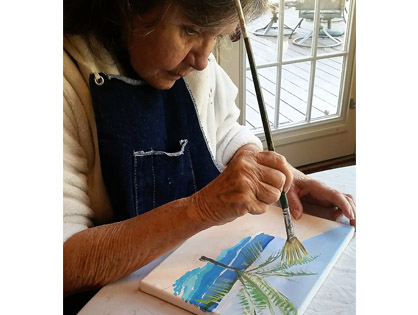
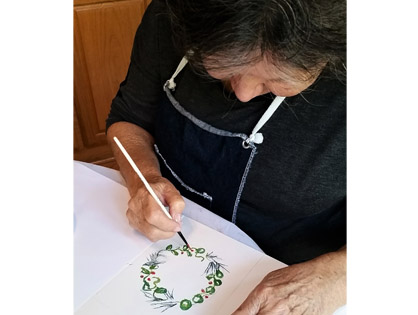
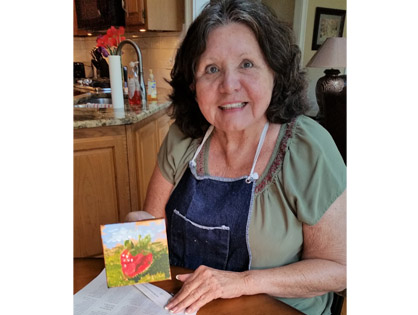
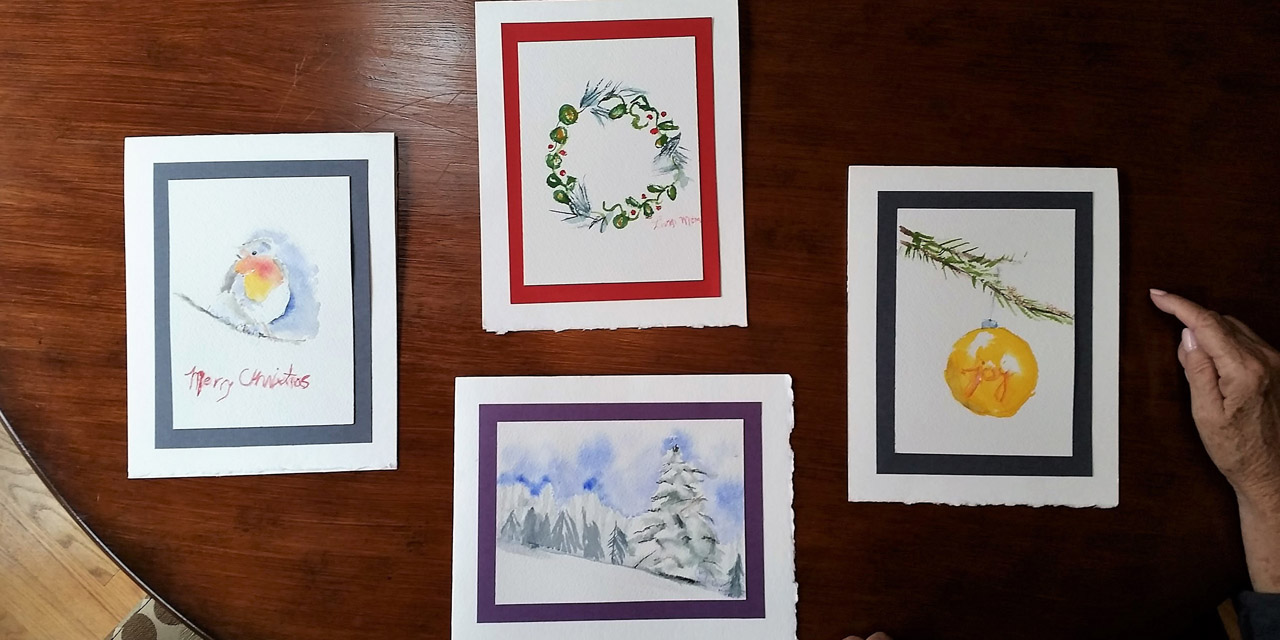
10. Begin a Stole Ministry
A stole or tallit can be liturgical art. This ministry encourages your pastor, chaplain, priest, or rabbi to use liturgical art in promoting dementia friendly faith communities. In her book, Stolen Memories: An Alzheimer’s Stole Ministry & Tallit Initiative, Lynda Everman offers step by step instructions and describes the use of hand-sewn, individualized stoles and stole-style tallitot in advocacy for Alzheimer's and related dementias … but in the words of (Ret.) Bishop Kenneth L. Carder, author of Ministry with the Forgotten, Stolen Memories “is more than a creative book; it is an invitation to join a movement to bring hope and healing to people stigmatized and marginalized by society.”
An Invitation To Join a Movement
Lynda Everman
Advocate, Author, Co-Founder ClergyAgainstAlzheimer’s, Caregiver
Representatives from twenty faith traditions, and counting, now wear Lynda's creative art...all in the effort to raise dementia awareness, to honor the dignity of those who live with dementia, and to hold their memories.
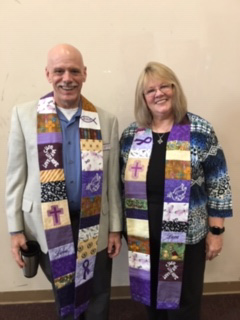
Rev. Ann Mann, Associate Pastor with Dr. David Campbell, Senior Pastor, Due West UMC
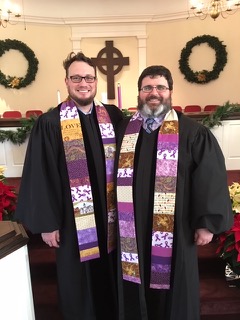
Rev. Derek Jacks and Rev. Sherrad Hayes, Cumberland Presbyterian
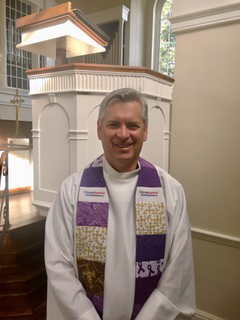
Rev. Dr. Donovan Drake, Presbyterian (USA)
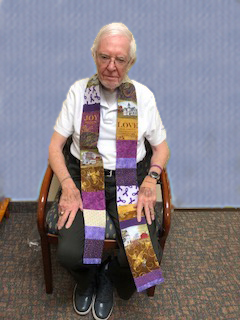
Rev. Dr. Richard L. Morgan (to whom the book is dedicated), Presbyterian (USA)
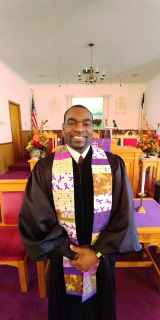
Rev. Bobby Fields, Jr., Baptist
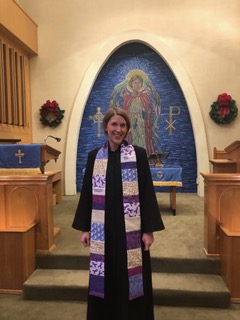
Rev. Katie Gilbert, Cooperative Baptist
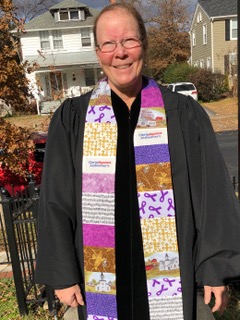
Rev. Kathy Fogg Berry, Interdenominational Christian
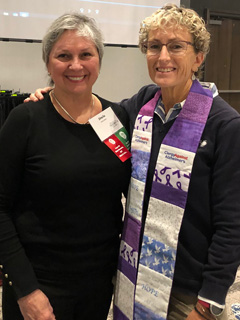
Rev. Linn Possell, United Church of Christ with Sheila Welch
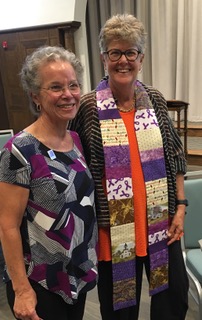
Rev. Tracey Lind (living with frontotemporal degeneration), Episcopalian with Lynda Everman
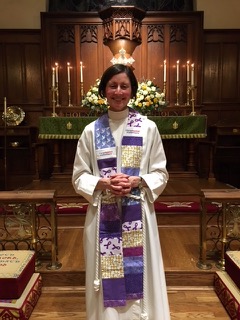
Rev. Danielle Thompson, Episcopalian
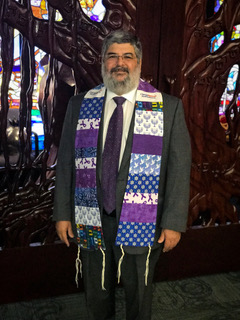
Rabbi Israel de la Piedra, Jewish
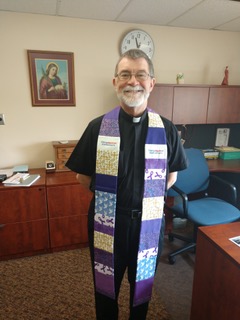
Monsignor Paul Fitzmaurice, Roman Catholic
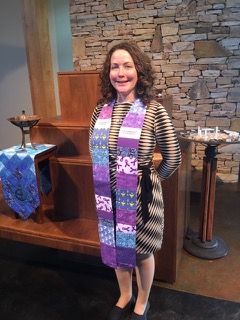
Rev. Julie Conrady, Unitarian Universalist
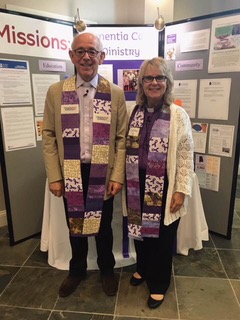
Rev. David Saunders, Anglican with Rev. Dr. Cynthia Huling Hummel (living with dementia), Presbyterian (USA)
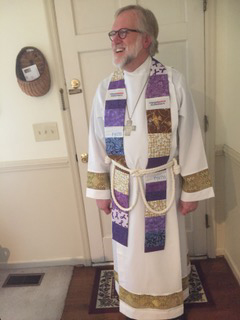
Rev. Dr. David Seymour, Lutheran
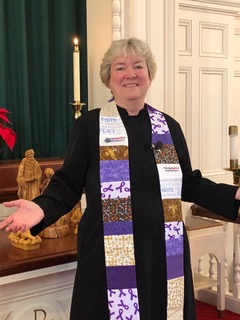
Rev. Carol Steinbrecher, Congregational
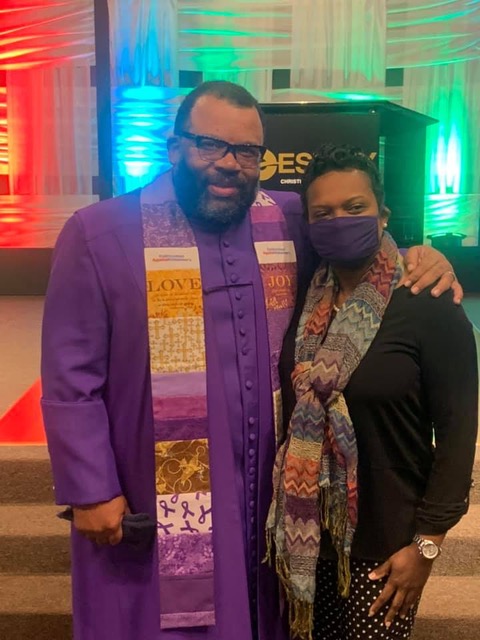
Bishop Glenn B. Allen, Sr., Destiny Christian Center International (Nondenominational) with Dr. Fayron Epps
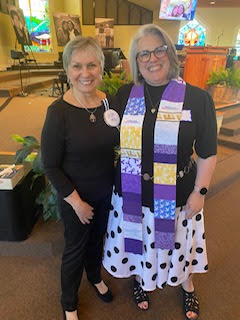
Sheila Welch, Coordinator: Loving Through Dementia and Terri Henkel, Associate Pastor - Alpharetta First United Methodist Church.
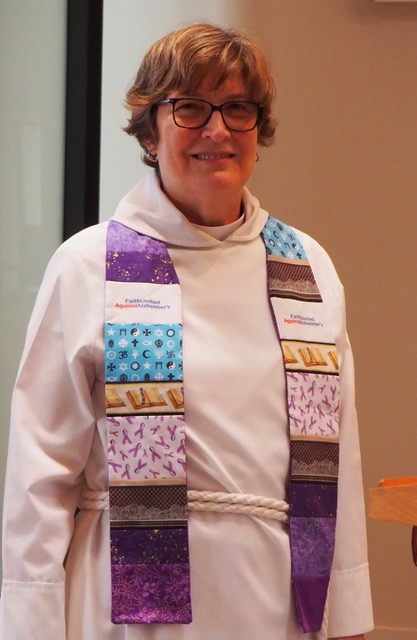
Janice Hicks wears a shorter, “portable” Chaplain’s Stole Chaplain and Ordained Deacon, episcopal Diocese of Washington
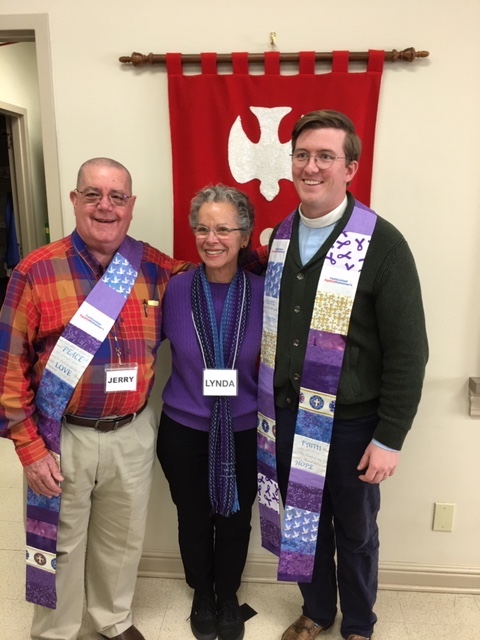
The Rev. Deacon Jerry Jacob and The Rev. Jay Gardner (Episcopalian)
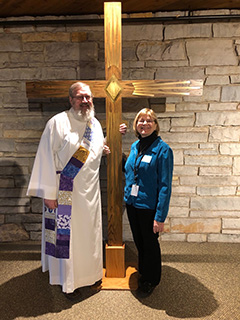
The Rev. Deacon Jim Saumweber and his wife, Georgie (Roman Catholic)
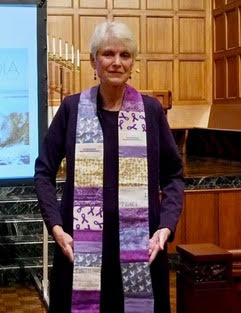
Rev. Dr. Mary Louise Bringle, Professor and Author of When Memories Fade, a hymn set to the tune, Finlandia.
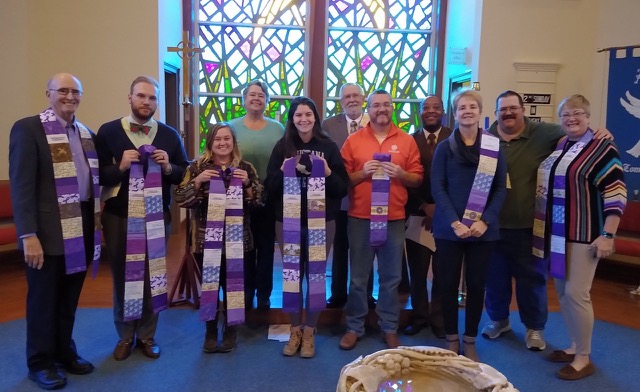
Bishop Ken Carder’s Commissioning Service with his students at the conclusion of his course, “Dementia Through a Pastoral Lens.”
Resource Links
11. Begin a Stephen Ministry
A Stephen Ministry is uniquely positioned to befriend the person living with dementia and the family loving that person through it...to let these families know that they are not alone. Encourage dementia training and education along with traditional Stephen Ministry training. A Stephen Ministry equips lay people to offer members of their congregation and community: prayer, support, encouragement, and a compassionate listening ear for as long as there is a need. A Stephen Ministry also offers vital support to the pastoral team.
Resource Links
- Stephen Ministries
- Basic Tips and Resources for Visiting
- Communicating As Dementia Progresses
- $ When Words Fail: Practical Ministry to People with Dementia and Their Caregivers
- $ Seasons of Caring: Meditations for Alzheimer’s and Dementia Caregivers
- $ Companion Leader Guide
- $ A Pocket Guide for the Alzheimer’s Caregiver
12. Begin a Congregational Respite Program – a Respite Ministry
Begin a Congregational Respite Program – a Respite Ministry, or join forces with other faith communities to provide a spiritually integrated program offering meaningful activities, social engagement, art, music and exercise for those living with dementia. This also provides a much needed respite for the caregiver.
Loving People Who Live With Dementia and Their Families
Daphne Johnston
Co-Founder and Executive Director - Respite for All
Resource Links
- Daphne Johnston's Respite for All Foundation
- Communicating As Dementia Progresses
- Basic Tips and Resources for Visiting
- $ Walking with Grace, Revised: Launching and Implementing a Congregational Respite Care
- $ Words Of Strength for Caregivers
- $ Devotional Books by Robin Dill: Advent to Epiphany; The Psalms; The Fruit of the Spirit; and Love, 1 Corinthians 13.
- Daphne Johnston’s Respite Ministry Videos
- Daphne Johnston’s Respite Ministry
- Reclaiming Joy Together by Daphne Johnston and Dr. Lawson Bryan
- Robin Dill Presentation: Why Congregational Respite Care?
- Dottie’s Story (Story About a Respite Dog)
13. Become Advocates
Start Now, Use What You Have, Do What You Can
- Lynda Everman
Advocacy for families facing dementia is filled with former caregivers. They, like Ellen Potts and Lynda Everman in the videos below, want to help make the next family’s journey easier.
The ripple effect of their advocacy is immeasurable...yours will be, too.
Advocate Ellen Potts
Advocate Lynda Everman
The choices in this Action Plan are here to help faith communities, groups, or individuals become champions for families facing dementia:
- We can raise dementia awareness and help others to do the same. We can help break the ugly stigma that comes with Alzheimer's and other related dementias.
- We can promote dignity and Person Centered Care for all who live with Alzheimer’s and related dementias.
The Person Centered Care philosophy focuses on the individual rather than on the condition, and on the person's strengths and abilities, rather than the losses.
- Lynda Everman and Don Wendorf
Treasure for Alzheimer's
Dr. Richard Morgan and Dr. Daniel C Potts
The Power of Empathy & Person-Centered Care
Lynda Everman & Don Wendorf, Psy.D.
- We can support persons living with dementia and their care partners and work together to advance better treatments, prevention, and a cure...and encourage others do the same.
Resource Links
14. Run with Your Own Unique Way to Serve These Forgotten Families
Dr. Fayron Epps attended Loving Through Dementia's very first Leader's Workshop. Using the toolkit provided, she ran with her own ideas! The Alter Program was born.